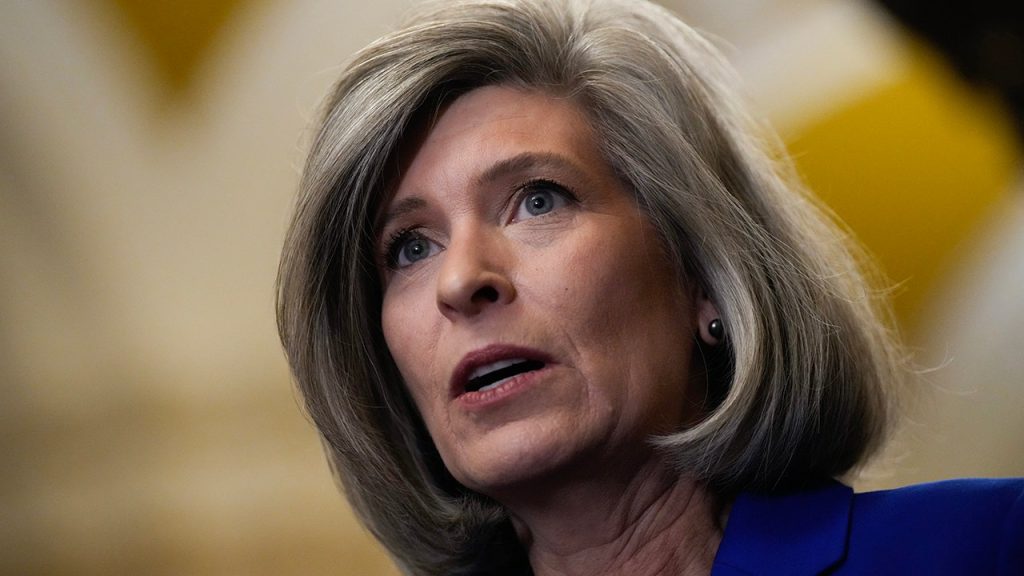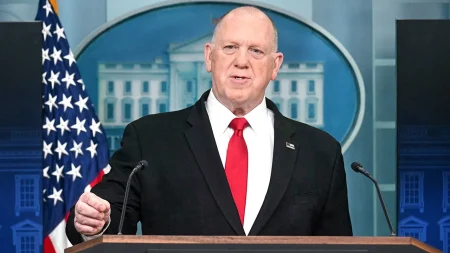Senator Joni Ernst, a combat veteran and influential member of the Armed Services Committee, finds herself at the center of a political maelstrom surrounding President-elect Trump’s nomination of Pete Hegseth for Secretary of Defense. Ernst, a survivor of sexual assault with a strong record on addressing such issues within the military, faces intense pressure from Trump loyalists to support Hegseth, despite concerns about his past conduct and suitability for the role. Her cautious approach, emphasizing a fair hearing based on facts rather than anonymous sources, has drawn both praise and condemnation, highlighting the complexities of navigating political loyalty and constitutional duty. This high-stakes confirmation battle carries significant implications not only for Hegseth’s future but also for Ernst’s own political career, as she faces potential primary challenges from within her own party.
Hegseth, a former Fox News host and Army National Guard officer, brings both military experience and considerable controversy to the nomination. Allegations of sexual misconduct and mismanagement of a veterans’ nonprofit organization have cast a shadow over his candidacy, prompting scrutiny from lawmakers and the media. While Hegseth has denied the allegations and pledged abstinence from alcohol if confirmed, the seriousness of the accusations raises questions about his leadership and judgment. Ernst’s position as a respected voice on military matters, particularly concerning sexual assault, places her in a delicate position, requiring her to balance her commitment to a thorough vetting process with the demands of party loyalty.
The pressure on Ernst to support Hegseth comes directly from Trump’s inner circle, with prominent figures like Charlie Kirk threatening to orchestrate a primary challenge against her in the upcoming 2026 election cycle. This aggressive tactic underscores the deep divisions within the Republican party and the lengths to which some are willing to go to enforce allegiance to Trump’s agenda. Steve Deace, another prominent conservative commentator, has also hinted at a potential primary challenge, adding further weight to the political risks Ernst faces. This external pressure creates a challenging environment for Ernst to exercise her constitutional duty of “advice and consent” without fear of political reprisal.
Complicating the situation further are swirling rumors about alternative candidates for the defense secretary position, including Florida Governor Ron DeSantis and even Ernst herself. While Trump has publicly expressed support for Hegseth, reports suggest he may be considering DeSantis as a backup option should Hegseth’s nomination fail to gain sufficient support. Ernst has denied any interest in the position, but her name continues to be mentioned, highlighting the fluidity of the situation and the potential for unexpected developments. This uncertainty adds another layer of complexity to Ernst’s decision-making process, as she must consider not only the immediate confirmation battle but also the long-term implications for her own political future.
Ernst’s careful approach, emphasizing a fair and thorough vetting process based on facts rather than anonymous sources, underscores her commitment to fulfilling her constitutional responsibilities. Her insistence on a full audit of the Pentagon and the appointment of a senior official who prioritizes the well-being and value of service members, based on merit rather than quotas, further demonstrates her focus on the critical issues facing the military. This measured stance allows her to navigate the political pressures while upholding her duty to thoroughly assess Hegseth’s qualifications.
The unfolding drama surrounding Hegseth’s nomination serves as a microcosm of the larger political landscape, highlighting the challenges of balancing party loyalty with constitutional duty in a highly polarized environment. Ernst’s predicament underscores the increasing pressure faced by lawmakers to prioritize political allegiance over independent judgment. The outcome of this confirmation battle will have significant implications not only for the future of the Department of Defense but also for the broader political discourse surrounding the role of senators in the confirmation process. The intense scrutiny and potential political repercussions faced by Ernst serve as a cautionary tale for other lawmakers who may find themselves in similar situations, highlighting the difficult choices and potential sacrifices required to uphold the principles of responsible governance.













